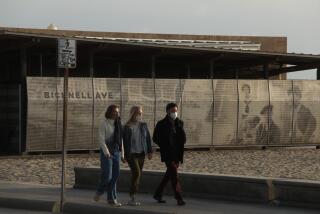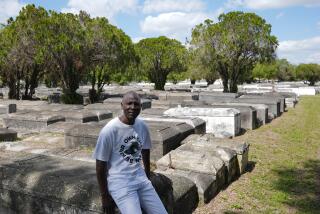To Black Clerk, Better Times Are Pie in the Sky
By custom, First National Bank of South Africa employees retire to their in-house social club on Friday afternoons. The men loosen their neckties, open frosty cans of Castle lager and unwind in discussion of everything from rugby to politics.
Danny Maimane, a rare black face among the bank workers, had finally begun to enjoy the weekly ritual. No longer a black among whites, he was beginning to feel like a man among equals in this new South Africa.
But the feeling quickly vanished one recent Friday when a white Afrikaner, swept up in a spirited debate, lapsed into the old language of baasskap , or white master.
“Hey, boy,” he said, addressing Maimane, a 43-year-old father of two. “Are you aware of this. . . .”
Maimane stiffened. “May I please see you for a moment?” Maimane asked, and the pair stepped into a quiet hallway.
“I’m unhappy with the way you addressed me,” Maimane began, speaking slowly to contain his anger. “I don’t think I deserved that.”
The surprised Afrikaner apologized. He hadn’t even noticed.
Later, Maimane shrugged off the incident. “It’s not easy to change the spots on a leopard,” he said. “The government degraded us, raped us of all values as human beings, reduced us to absolutely nothing. It will take time to change those attitudes.”
After their exchange, the Afrikaner went to his car and drove to his comfortable house and swimming pool in a quiet, well-tended suburb.
Danny Maimane walked to the street and waited in line with hundreds of other black workers for the cramped minibus taxi ride from Johannesburg to his home--No. 3243, Zone 2, Diepkloof, Soweto.
The journey to the Maimane house is a trek into the old South Africa. The government may have dismantled most of apartheid and made it easier for Maimane to speak his mind, but that hasn’t changed life in Soweto.
A bedroom community of 2.5 million people, nearly the size of Chicago, Soweto dwarfs nearby Johannesburg’s 1 million people. And yet street signs are as rare as white people. The maze of narrow streets is clogged with pedestrians and children batting homemade balls of twine with crooked sticks. A coal-smoke haze perennially blankets this sprawling creation of apartheid, and visitors are struck by the absence of trees, parks, sports fields or tennis courts.
Danny and Gwendoline Maimane live in a square, four-room “matchbox” house, identical to every house on the block and tens of thousands of others here. Their front door opens directly into the living room, which also functions as the dining room, TV room, study room, lounge and children’s playroom.
Sitting in his beige velour armchair, Danny is just six steps from the street outside.
Danny does his best to brighten his small yard by planting gladioli and other flowering plants. But he considers Soweto “a slum. A dignified slum, but still a slum.”
“Do we like Soweto?” he asked the other day. “The answer is yes and no. Do we have a choice? No. Can we make the best out of the worst? Yes.”
The Maimane house has two bedrooms. Danny and Gwendoline sleep in one and the second is shared by their children, 9-year-old Sepadi and 6-year-old Obakeng, and two nieces, 24-year-old Dimakatso and 16-year-old Lebo.
Dimakatso takes college courses through correspondence. Lebo, who is in high school, was sent here by her parents in Katlehong, a township where fighting among blacks and attacks on white teachers have made getting an education impossible.
“Can you call this a house? Four rooms. Can you?” Danny demanded of a visitor. Then he laughed. “I guess you can, but only because it has a roof on top.”
Added Gwendoline: “We don’t have a choice.”
The Maimanes, like the other 29 million blacks in South Africa today, live in a freer society than they’ve ever known. They can say what they think and join any political organization they please. And, soon, they will even be able to vote.
But the promise of a piece of the pie for everyone, black and white? It is but a dream for the teachers and laborers and truck drivers and clerks in the Maimanes’ neighborhood. The state no longer tells them where to live. But their pocketbooks, picked clean by decades of denied opportunities and unequal pay, still do.
Danny, a slim man with close-cropped hair, is a production assistant at the bank, working, his boss says, with the highly confidential payrolls of the bank’s corporate customers.
Gwendoline, a soft-spoken 39-year-old with a gentle, round face, works as a nurse in Ward 20 of Soweto’s giant Baragwanath Hospital. All of her patients are black; all of the doctors and most of the supervisors are white.
Her 63-bed ward often holds 100 patients. Some are discharged prematurely to ease the overcrowding; the more serious cases are given mattresses on the floor. “The only solution is to give them one blanket, which is terrible,” Gwendoline said.
Together, the Maimanes earn $15,000 a year. About $2,400 of that is spent on tuition for their son at a private primary school for children with learning disabilities. Black schools have no facilities for such children.
They’d like to own a car, but they cannot afford it.
They’d also like to move to a larger house, perhaps in a white area, and, if their income increases, have a third child. But few blacks have the money to buy in the white suburbs, where home prices start at about $70,000--10 times the value of their house in Soweto.
“We can’t even make ends meet now,” Gwendoline said.
Danny has lived in these four rooms since he was 10 years old. The white government forced his and Gwendoline’s families, along with thousands of others, to leave Alexandra, a township in the middle of Johannesburg’s wealthiest white suburbs that the authorities hoped to raze.
Danny still remembers riding the truck on moving day, perched atop his family’s meager possessions, and the two loaves of bread that the white government driver gave the family as a parting gift. They were deposited in Zone 2, which was reserved for the Tswana people.
Gwendoline’s family moved from Alexandra a year later, ending up in Zone 5 because her father was a Xhosa.
When ill health forced Danny’s father to quit work at a dry cleaning shop in Johannesburg, Danny was forced to drop out of high school. He has tried to make up for that by taking night classes in marketing and English.
Although he and Gwendoline speak six African languages, in addition to English, they believe English is the language they will need to get better jobs and improve their standard of living.
In his nine years at the bank, Danny has risen steadily up the ladder. And although the bank no longer has lower pay scales for blacks, Danny notices that most of his white co-workers have cars and large houses. He’s not sure why, but he knows that whites always have had more money than blacks in South Africa.
“Ten years ago, if I had gone to a bank to deposit 10,000 rand, they would have called the police and said, ‘Here’s a thief,’ ” Danny said. “The only way a black man could get that much money was by stealing.”
These days crime is an obsession in the white suburbs. But crime is much worse in townships like Soweto, where the victims, like the criminals, are black. The emergency room at Baragwanath Hospital resounds nightly with the cries of pain from gunshot and stabbing victims.
The Maimanes haven’t been immune, either. While walking in Soweto one evening last year, Danny was accosted by three youths after his watch. They stabbed him six times before escaping empty-handed. Danny was lucky that time; the knife wounds narrowly missed vital organs.
“We live in fear every day,” Gwendoline said. Shots have been fired at the taxis she takes to work. And half a dozen passengers have been shot to death at the taxi stand across from her hospital in the past year, caught in the cross-fire of a war over routes between taxi drivers.
Danny stopped taking the train to work long ago. More than 100 train riders have been killed on the Soweto-Johannesburg route in the last six months, apparently by groups hoping to create political instability in the township.
At the same time, battles between Inkatha Freedom Party supporters living in squalid men’s dormitories and residents aligned with the African National Congress have become a regular feature of township life.
While they welcome the new freedoms for blacks in South Africa, Danny and Gwendoline have grave doubts about the future. They worry that no government, black or white, will be able to deal with their ebbing quality of life, increasing township violence and the low standard of education in black schools.
They once were ANC supporters, but lately they’ve changed their minds. They say they’d never consider supporting De Klerk. But, given a choice between the ANC and De Klerk’s National Party, Danny and Gwendoline say they would rather forgo what would otherwise be their first ever visit to the polls.
“The ANC is too preoccupied with attaining the political kingdom,” Danny said. “And if you try to reason with them, you end up being their enemy. It’s better to keep quiet.”
His biggest worry is that the ANC has raised black expectations too high and made promises--such as returning land to blacks--that it cannot fufill.
“The white man owes the black people, but we blacks need to get rid of our dependence mentality,” Danny said. “And this is not what the ANC is teaching.”
But when Danny hears whites say, as they often do, that blacks cannot run a country, it hurts.
“We wish we could be judged on what we can do,” he said. “Why can’t they see a value in us?”
More to Read
Start your day right
Sign up for Essential California for news, features and recommendations from the L.A. Times and beyond in your inbox six days a week.
You may occasionally receive promotional content from the Los Angeles Times.







